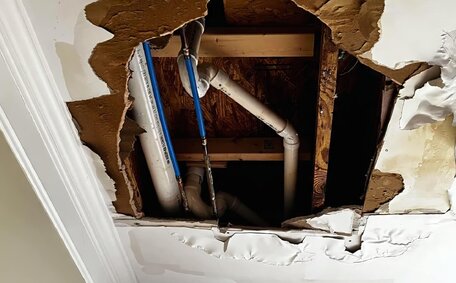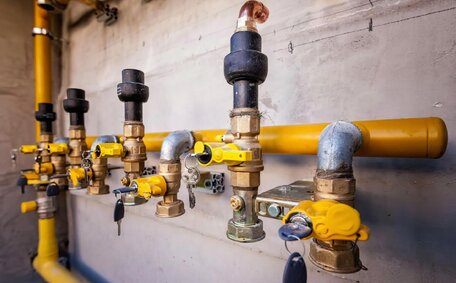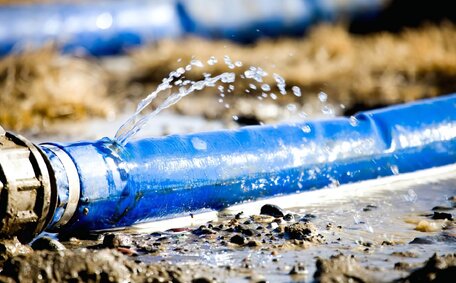Introduction to Pipe Relining for Industrial Facilities
Pipe relining is a state-of-the-art trenchless solution offering significant advantages for This method includes inserting a new pipe lining within existing structures, effectively sealing any cracks and reinstating structural strength while curbing the upheaval your plumbing systems may face. The relined pipe work is stronger than brand new pipework, obviating the need to dig with minimal excavation or disruption.
For industrial settings with sprawling underground systems, Our relining services effectively tackle corrosion and root incursion, averting the expensive excavations and downtime associated with traditional methods. Our sewer relining services, along with potable water line maintenance and more, safeguard your system against damage using cutting-edge technology. Pipe relining is a cost-effective, long-term strategy for unblocking drains and preserving drainage systems without the need for extensive excavation.
In our plumbing services, We apply comprehensive structural reinforcement to combat tree roots and other intrusions using specialist epoxy resin or Polyurethane coatings, condensed from precise assessments using CCTV cameras. Leveraging CCTV technology ensures effective pipe relining by allowing for the thorough cleaning and inspection of pipes prior to the installation and curing of the new lining. Sealing damage and restoring flow ensures smooth operations and helps avert future complications.
At Proximity Plumbing, we pride ourselves on being the experts in pipe relining Sydney, dependable for all plumbing and drainage system needs. Our extensive experience in commercial pipe work allows us to comprehensively evaluate your pipe concerns and ascertain if relining is the solution you need.
We are dedicated to maximising convenience for our customers, safeguarding their plumbing network integrity and reducing operational setbacks.
For repairing broken pipes, relining is invaluable by avoiding the need for excavation, downtime, and related business expenses. Contact us today to explore your pipe relining options in Sydney.
Typical Causes of Pipe Damage in Industrial Settings
Industrial facilities on your property contend with some unique pipe damage causes, due to the nature of their operations and infrastructure.
Corrosion is a major issue, especially for long pipe runs carrying corrosive substances. Chemicals, high-temperature fluids, wastewater and steam condensation accelerate corrosion in pipes over time. Industrial processes also generate abrasive particulates that scrape and wear down pipe interiors.
Premature pipe remediation becomes necessary due to high-pressure flows and heavy use. Vibrations from large machinery can affect the integrity of pipelines, including the hot water system, potentially loosening joints.
Thermal expansion and contraction take their toll on old pipe infrastructure. Ground shifts from truck traffic undermine buried pipes.
With sophisticated pipe relining technology, even materials like galvanised steel and polybutylene can be protected against chemical interactions. Sulfuric acid produced by bacteria in stagnant water can lead to pipe corrosion. Acidic wastewater from electroplating or hot effluent from smelters damages drainage.
For those grappling with deteriorated conduits, relining offers peace mind by furnishing all-encompassing pipe rehabilitation without significant digging. Custom-fit epoxy coatings or new PVC/PE liners restore integrity, efficiently and cost-effectively. Proactive Sydney relining also proves to be more cost effective than future repairs for damage and leaks from industrial causes, including storm water complications.
How to Evaluate Pipes for Relining
Figuring out what pipe in your plumbing is an apt nominee for industrial application of pipe relining necessitates scrupulous evaluation. There are several telltale signs that indicate the need for pipe rehabilitation or relining to look out for when inspecting your pipeline:
- Visible corrosion and pitting on the exterior of above-ground pipes. This suggests interior damage.
- Water staining and mineral deposits around joints, unions and foundations where leaks have occurred.
- Slow draining flow from clogged, corroded pipes.
- Sudden loss of pressure and capacity in water systems.
- Detection of tree root invasions or contaminants infiltrating potable water lines.
- Regular blockages and fat/grease buildup inside the sewer line.
- Strong odours emanating from drainage systems.
- Sunken soil/asphalt above buried pipes may indicate damage.
If you observe any of these warning signs, a CCTV pipe inspection is recommended. Our technician does pipe relining and will talk you through the meticulous examination of your plumbing system’s interior condition via CCTV footage captured by a pipe camera. The exact location and severity of plumbing issues such as damage, cracks, holes and blockages in your pipes will be identified.
Leveraging CCTV insights, we ascertain if there’s need for extensive renovation, or whether pipe relining will suffice. Multiple factors are considered, but given our hands-on experience, we’d readily recommend them for relining if pipes are in fair or better condition.
We highly recommend relining as it restores structural stability without the need to dig up areas, and it does more than merely seal leaks; it smooths surfaces and prevents future wear and corrosion. It’s a budget-friendly trenchless rehabilitation technique that assures you of mess no fuss with no substantial downtime for your operations.
When it comes to a detailed assessment and grasping the benefits of pipe relining for your industrial facility, take the next step and secure your free quote by contacting us today.
Overview of the Pipe Relining Process
The pipe relining process is a trenchless rehabilitation technique that revives old, worn pipes, a process so seamless it rarely warrants an emergency call out. Our approach to a damaged pipe consists of inserting a new lining within the host to seal cracks, repair issues, and forefend future problems.
Here are the key steps involved in injecting the solution into pipe relining from start to finish:
- Initial CCTV inspection - A camera is threaded through the pipe within the existing infrastructure to assess the location and extent of any damage, corrosion, cracks, or obstructions.
- Pipe cleaning - Our effective drain cleaning service answers the question of relining duration by rapidly and thoroughly cleaning the existing pipes with high-pressure water jets to eradicate debris, grease, or scaling.
- Resin coating - A durable composite resin, typically epoxy or polyurethane, fills cracks or voids inside the pipe.
- Liner insertion - A new structural liner, usually PVC or another type material, is inserted into the coated pipe and meticulously expanded to ensure a precise fit.
- Curing - Curing - The liner solidifies through air or water pressure, steam, or UV light, securing it firmly in place.
- Final CCTV - A meticulous camera inspection re-evaluates the relined pipe to certify achievement and pinpoint any imperfections.
In our commitment to uphold the trust of our clients, we use premium epoxy coatings to strengthen worn conduits in industrial settings. The custom-fit liners seal damage, prevent leaks and enhance flow capacity. For large pipes exceeding 300 mm, our non-invasive repair opts for UV-cured fibreglass or polyester liners, eliminating the need for traditional invasive methods.
Relining restores pipe strength and stability without the need for disruptive digging or complex replacements. It negates corrosion and abrasion damage, providing a smooth non-stick surface. Trenchless pipe relining ensures your crucial industrial pipelines are swiftly renovated with minimal impact on your operations.
Advantages of Pipe Relining vs Replacement
Relining offers an innovative, less intrusive alternative to full pipe replacement when addressing deteriorated infrastructure. Nonetheless, pipe relining proffers significant advantages over the customary process of digging up replacing piping systems:
- Minimal disruption - Our advanced relining techniques allow pipes to be renewed without the need for extensive excavating. This results in no significant disturbance to operations or disruption, which does not require more intervention in your business activities.
- Faster process - Relining pipes takes days or weeks, rather than the months required for a full system replacement.
- Cost savings - The pipe relining cost is more economical, with none of the hefty expense like that of replacement. There are no expenses for new pipe materials, trenching, or restoring surfaces.
- Longevity - Epoxy-coated and relined pipes can not only surpass the longevity of brand new PVC or steel pipes but also preserve a steadfast working order across their protracted life. Epoxy-coated and relined pipes often exhibit a good working order for 50+ years.
- Environmentally friendly - Relining rehabilitates pipes in place, reducing landfill waste and environmental impact.
- Versatility - Pipe relining can used adeptly, and is versatile enough for repairing all types of pipe materials, sizes, and arrangements.
- Relining significantly reduces surface disruption, ensuring roads, pavements, and landscaped areas above the pipes remain undisturbed.
- Prevents future damage - Epoxy coatings seal ageing pipes to prevent corrosion, cracks and leaks down the track.
- Maintains pressure - Smoothing pipes restores optimal water pressure and flow capacity.
- Improved flow - Relining addresses the concern of a blocked drain without fuss, dislodging any interior obstructions, accumulation and securing unimpeded flow.
In countless scenarios, particularly with your pipe work, relining vs pipe replacement provides advantages for industrial facilities. Minor excavations are only required at access points. Your essential underground pipelines are protected and revitalised without the significant costs and downtime associated with traditional pipe replacement.
Considerations for Industrial Pipe Relining
There are a multitude of critical factors to appraise when discerning if a pipe relining specialist is the correct pick for your industrial amenity:
- Pipe material and condition - The existing pipe material and its structural integrity helps determine suitability. Relining works for many materials like concrete, clay, galvanised steel, and cast iron pipes in fair or better condition.
- Pipe size and configuration - Relining can accommodate pipes from 30 mm to 300 mm diameter and larger. Complex pipe routes with bends and junctions can often be relined.
- Flow and pressure - Relining restores flow capacity and pressure handling comparable to new pipes. High pressure, high temperature and abrasive/corrosive flows are fine.
- Access considerations - Relining requires entry points to deploy equipment; readily available access points like unions or valves simplify this process.
- Purpose - Drainage, sewage, potable water and other pipe systems can benefit from relining.
We employ state-of-the-art epoxy coatings and fibreglass/PVC liners for superior pipe rehabilitation. Our advanced pipe relining solutions restore structural integrity, effectively seal damage, prevent leaks, combat corrosion and abrasion, minimize blockages, and negate the need for new materials or excavation. Your operations can continue with minimal disruption.
Relining worn industrial pipes maximises their lifespan cost-effectively. Contact our team today regarding your pipe inspection and relining needs. We service all makes and diameters of pipes, including those in the eastern suburbs, to keep your business flowing smoothly.
Choosing a Qualified Contractor
When considering pipe relining for an industrial facility, it is crucial to select an experienced, qualified contractor. When choosing a relining contractor, consider the following key factors:
- Industry experience - Look for a contractor with extensive expertise in commercial and industrial relining projects specifically. They should showcase a verifiable chronicle of success in diverse facilities, clearly knowing what they were doing.
- Qualifications - It’s essential that the contractor possesses the necessary state licensing and industry certifications for pipe relining. Their technicians should be fully trained and qualified to carry out the work.
- Quality materials - A reputable contractor will use industry-leading epoxy resins and liners to ensure the highest quality and longevity of the relining work.
- Safety record - An emphasis on safety practises, compliance with regulations, and training helps avoid risks and liability concerns.
- Insurance - Fully insured contractors offer security, protecting the customer from damages or incidents during the relining process.
- Equipment - Using the latest tools and CCTV technology allows for precise inspections and skilled relining application.
- Warranties - Numerous contractors render warranties on relining tasks, conferring peace of mind regarding the value and outcomes delivered.
At Lindfield Plumbing, our expertise is demonstrated by consistently surpassing all criteria for exemplary pipe relining services. With over a decade’s expertise in cutting-edge pipe relining across Sydney, we are the go-to experts for industrial pipe solutions. Our qualified team possesses all necessary licences and certifications for industrial and commercial relining projects.
Safety is our paramount concern; we ensure stringent standards are at the forefront of every project. Our recent undertaken job was a testament to our commitment to quality work, completed with full insurance and an assurance of unmatched quality.
Concluding Thoughts
Pipe repairs are transformed with pipe relining, demonstrating how efficiently we get the job done for industrial sites struggling with damaged or deteriorated underground pipes. This advanced trenchless method revitalises old pipes internally, sealing cracks, reinforcing structure, and averting subsequent deterioration and corrosion.
Relining outperforms traditional pipe repair by being less disruptive, quicker, more cost-effective, and environmentally friendlier. Custom-fit epoxy coatings and new PVC/PE liners restore structural integrity and flow capacity to drainage, sewage and potable water pipes.
When evaluating relining, key considerations include pipe material, size, configuration, and the nature of flows. With adequate access and pipes in reasonable condition, relining can extend the lifespan indefinitely.
Collaborating with Lindfield Plumbing, synonymous with quality and experience, guarantees superior, enduring results in pipe relining. We use industry-leading materials and the latest CCTV technology to deliver specialised commercial and industrial relining services across Sydney.
Schedule your consultation with us to thoroughly explore your relining options. We can assess your pipeline with CCTV, advise the best solutions, and carry out professional trenchless relining with minimal disruption to your operations.






